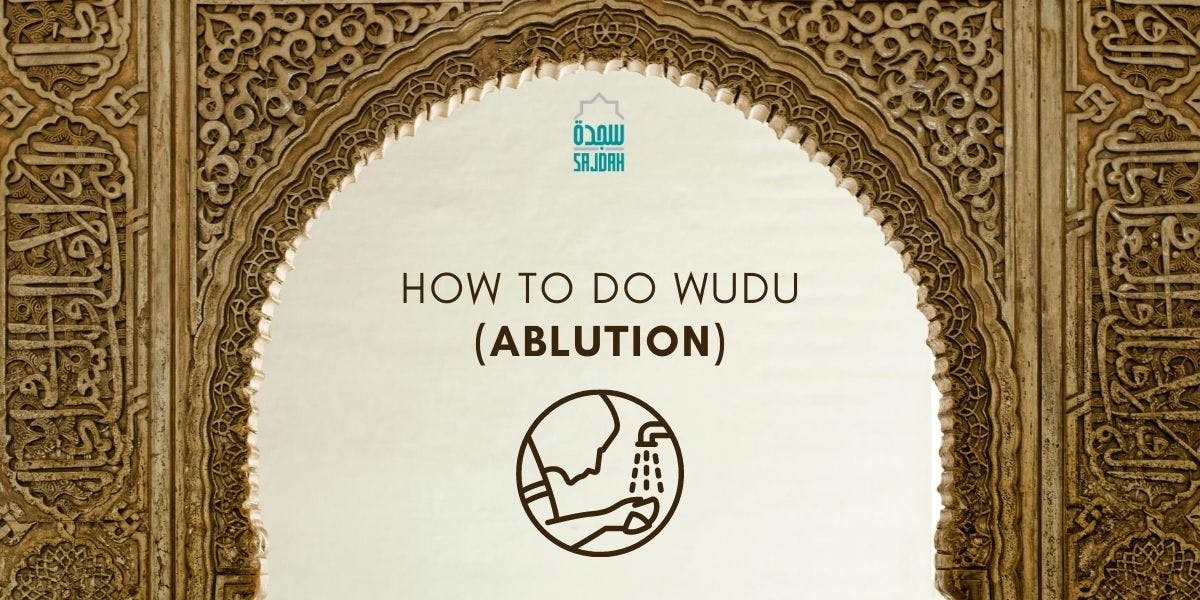Blog Post
2020-08-31

Obligatory parts of wudu
(i) Washing the face completely once, which includes rinsing the mouth and nose.
ii) Washing the arms up to the elbows, once.
(iii) Wiping the entire head, including the ears.
(iv) Washing the feet up to ankles, once.
What is meant by the once in all the above is that the entire part of the body mentioned must be washed thoroughly?
(v) This must be done in order, so one washes the face first, then the arms then wipes the head, then washes the feet, because the Prophet (ﷺ) did the wudu in this order.
(vi) This must be done continuously i.e. the parts of the body must be washed one after the other with no lengthy interruption between washing one and the next.
These are the obligatory parts of wudu which must be done in order for wudu to be sound.
The evidence for these obligatory parts of wudu is the verse in which Allah says:
يَا أَيُّهَا الَّذِينَ آمَنُوا إِذَا قُمْتُمْ إِلَى الصَّلَاةِ فَاغْسِلُوا وُجُوهَكُمْ وَأَيْدِيَكُمْ إِلَى الْمَرَافِقِ وَامْسَحُوا بِرُءُوسِكُمْ وَأَرْجُلَكُمْ إِلَى الْكَعْبَيْنِ
O you who have believed, when you rise to [perform] prayer, wash your faces and your forearms to the elbows and wipe over your heads and wash your feet to the ankles.
Mustahab parts of wudu. These were narrated in the Sunnah of the Prophet (SAW), the details of which are as follows:
(i) You must have the intention of purifying yourself and removing impurity. The intention should not be spoken out loud for its place is in the heart. This applies to all acts of worship.
(ii) You should say Bismillah.
(iii) Then you should wash your hands three times.
(iv) Then you should rinse your mouth three times, swirling the water around inside your mouth, and rinse your nose three times, blowing the water out and using the left hand to remove the water from your nose.
(v) You should wash your face three times, from the hairline to the jawbone and chin, and from ear to ear. A man should wash the hair of his beard because it is part of the face. If his beard is thin he has to wash it inside and out, and if it is thick and covers the skin, he should wash the surface of it only and run his wet fingers through it.
(vi) Then he should wash his arms up to the elbows three times. The arm extends from the fingertips, including the nails, to the lower part of the upper arm. It is essential to remove anything stuck to the hands before washing them, such as dough, mud, paint, etc, that could prevent the water from reaching the skin.
(vii) Then after that, he should wipe his head and ears once with fresh water, not the water leftover from washing his arms. The way in which the head is to be wiped is that you put your wet hands at the front of your head and bring them to the back of your head, then bring them back to the place where you started.
Then put your index fingers in your ears and wipe the back of your ears with your thumbs. With regard to a woman's hair, she should wipe it, whether it is loose or braided from the front of her head to the roots of the hair at the nape of her neck, but she does not have to wipe the entire length of her hair.
(viii) Then you should wash your feet three times up to the ankles, namely the bones at the bottom of the leg.
(Narrated by Muslim, al-Tahaarah, 331)
The water must also be pure (Tahir), for impure (Najis) water cannot be used for wudu. One must also remove anything that could prevent water from reaching the skin and nails, such as nail polish.
It is prescribed to say Bismillah according to the majority of the scholars but they differ as to whether it is obligatory or Sunnah. If one remembers to say it, it may be said either at the beginning of the wudu or during it.
There is no difference between men and women in the way wudu should be done.
It is mustahab to say, when one has completed wudu:
أَشْهَدُ أَنْ لَا إِلَـهَ إِلاَّ اللّهُ وَحْدَهُ لَا شَريـكَ لَـهُ وَأَشْهَدُ أَنَّ مُحَمَّـداً عَبْـدُهُ وَرَسُـولُـهُ.
I bear witness that none has the right to be worshipped except Allah, alone without partner, and I bear witness that Muhammad is His slave and Messenger.
Muslim 1:209
اَللَّهُـمَّ اجْعَلْنِـي مِنَ التَّـوَّابِينَ وَاجْعَـلْنِي مِنَ الْمُتَطَهِّـرِينَ.
O Allah, make me of those who return to You often in repentance and make me of those who remain clean and pure.
At-Tirmidhi 1:78

